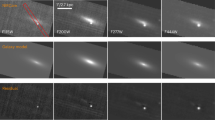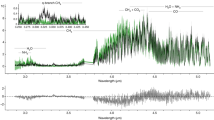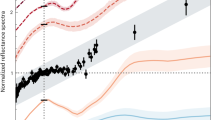Abstract
MEASUREMENTS of high energy X rays in the region of the Crab Nebula were made with the Imperial College detector on Ariel V between April 13 and April 29, 1975. During that time the X-ray nova A0535+26 was first detected and observed to rise to its maximum intensity1,2. At 30 keV this nova reached an intensity considerably brighter than the Crab Nebula, making it the brightest known source in the sky.
This is a preview of subscription content, access via your institution
Access options
Subscribe to this journal
Receive 51 print issues and online access
$199.00 per year
only $3.90 per issue
Buy this article
- Purchase on Springer Link
- Instant access to full article PDF
Prices may be subject to local taxes which are calculated during checkout
Similar content being viewed by others
References
Rosenberg, F. D., Eyles, C. J., Skinner, G. K., and Willmore, A. P., Nature, 256, 628–630 (1975).
Ricketts, M. J., Turner, M. J. L., Page, C. G., and Pounds, K. A., Nature, 256, 631–633 (1975).
Felton, J. E., and Rees, M. J., Astr. Astrophys., 17, 226 (1972).
Pringle, J. E., and Rees, M. J., Astr. Astrophys., 21, 1 (1972).
Author information
Authors and Affiliations
Rights and permissions
About this article
Cite this article
COE, M., CARPENTER, G., ENGEL, A. et al. Hard X-ray measurements of nova A0535+26 in Taurus. Nature 256, 630–631 (1975). https://doi.org/10.1038/256630a0
Received:
Accepted:
Issue Date:
DOI: https://doi.org/10.1038/256630a0
This article is cited by
-
Hard X-Ray/Soft Gamma-Ray Experiments and Missions: Overview and Prospects
Space Science Reviews (2017)
-
X-ray emission from Be star/X-ray binaries
Space Science Reviews (1994)
-
A 0535 + 26/HDE 245770: A typical X-ray/Be system
Space Science Reviews (1992)
-
The first uv studies of the optical candidate for the X-ray source 1118-61
Astrophysics and Space Science (1985)
-
Second catalogue of X-ray sources
Astrophysics and Space Science (1982)
Comments
By submitting a comment you agree to abide by our Terms and Community Guidelines. If you find something abusive or that does not comply with our terms or guidelines please flag it as inappropriate.



